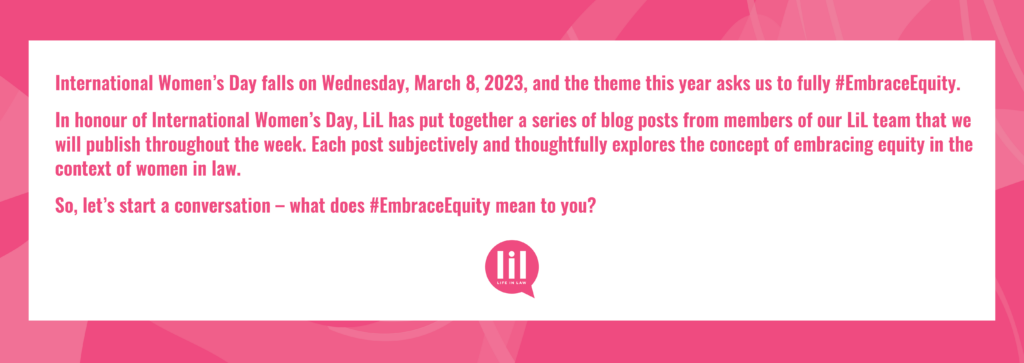Equity v. Equality

“Equality is giving everyone the same pair of shoes. Equity is giving everyone a pair of shoes that fits.”
-Author unknown
I grew up in the 80s, graduating from law school in 1992. My early exposure to feminism was focused on ensuring that women were given the same opportunities as men – specifically opportunities in the workplace and in life in general. The 80s were a very different time for women and this time in history had a very different focus when it came to understanding the barriers to equality that women faced. The seminal 1973 decision of Roe v. Wade legalized abortion in the US and it was only in 1988 that the Supreme Court of Canada legalized abortion for Canadian women in all circumstances. Prior to the Morgentaler decision, s. 251 of the Criminal Code made the provision of abortion illegal. The Supreme Court found s. 251 to be unconstitutional, finding that limiting the pregnant woman’s right to abortion, violates her right to life, liberty and security of the person within the meaning of s. 7 of the Charter in a way which does not accord with the principles of fundamental justice. The Chief Justice of Canada, Brian Dickson, wrote the reasons for the majority decision, stating:
Forcing a woman by threat of criminal sanction, to carry a fetus to term unless she meets certain criteria unrelated to her own priorities and aspirations, is a profound interference with a woman’s body and thus a violation of security of the person.
This decision demonstrates the seeds of the concept of equity and equality and how it relates to women’s experience in the world.
The 80s also saw the birth of LEAF (Women’s Legal and Action Fund), which was founded in 1985. LEAF focuses on achieving gender equality through intervention in cases involving substantive gender equality issues. In the 80s, the goals of the feminist movement were freedom, equality and control over their lives.
The feminist movement of the 90s was led by Gen Xers, my generation. We had benefited from the work of the feminists that preceded us and largely felt that we had gained autonomy over our bodies (rights to abortion), substantive equality and freedom to do as we wished rather than being defined by our gender. Significant legal rights and protections had been gained by the 90s and the focus shifted – we expected opportunities and the same opportunities as our male counterparts. Throughout the 90s, female participation in the workforce and their income rose, never achieving parity with men but improving. But true equality was never achieved. Women were participating in the workplace, trying to participate in the same way that men did, but the reality of biology was being ignored. We were attempting to achieve equality without regard to equity.
The 21st century has seen a shift again. While the focus of feminism and the women’s movement has traditionally been on achieving equal opportunity for women, the modern women’s movement recognizes that women come to the table differently than men. Biologically we are different, not better, not worse, but different. Those differences mean that we need a different pair of shoes – what fits for men, may or may not fit for women. Women now recognize that the term gender equality is actually damaging to their ability to effectively challenge the barriers that all women experience within their lifetimes. What does equality mean? Equal pay for equal work is a concept that is not hard to get behind and yet still now, in the year 2023, women earn less than men all over the world. Women experience many barriers to equality in the workplace. They are more likely to be discriminated against based on maternity and they are far more likely to have to abandon work due to domestic and caring responsibilities. Gender roles and stereotypes negatively impact both women and men in the workplace. Traditional ideas of feminism center around seeking equal opportunities for women but doing so without recognition of the ongoing barriers to equality that women face mean that true equality will never be achieved. Equality can only be achieved when equity becomes a part of the equation.
Equality and equity are two very different concepts. Equity is a necessary element to achieving equality and seeking equality without regard to the importance of equity results in equality being unachievable. The challenge that society as a whole currently faces is how we can continue the pursuit of equality while allowing equity a seat at the table.
About the Author

Rose Keith, KC is a partner with Harper Grey. Not only is she a skilled mediator, she also maintains a multi-faceted practice focusing on workplace law assisting both employers and employees. In both realms, she is known for her broad subject matter expertise, legal acumen and sound judgment. Rose is a blur of perpetual motion lending her irrepressible enthusiasm to many different organizations and associations she passionately supports both inside and outside the legal community.